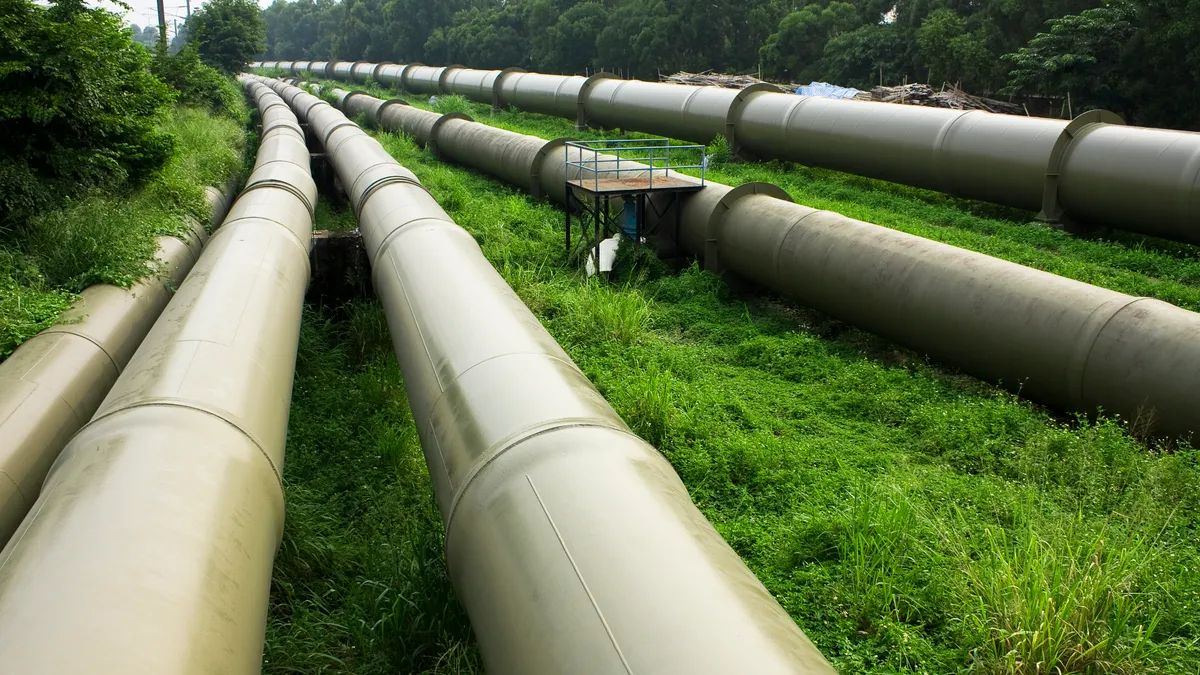Dive Brief:
- The Fourth Circuit Court of Appeals on Tuesday struck down a permit necessary for Dominion Energy to construct its Atlantic Coast Pipeline (ACP), concluding Virginia regulators failed to consider issues of environmental justice when approving a new compressor station.
- The court vacated the air quality permit and remanded it back to Virginia's State Air Pollution Control Board for further review. Dominion officials said they will immediately begin to work with the state to resolve the issues identified by the court.
- Opponents of the 600-mile pipeline called the latest setback for ACP a "huge victory" and noted the project has suffered a series of defeats. Last July, the court concluded the U.S. Fish and Wildlife Service had not sufficiently considered the project's impacts under the Endangered Species Act.
Dive Insight:
Dominion maintains the $7.5-billion pipeline is "needed now more than ever" for economic growth and to reduce carbon emissions, but the court called out regulators for failing to adequately consider the impacts on local populations.
The Fourth Circuit concluded Virginia regulators relied too heavily on air quality standards, leading it to dismiss issues of environmental justice and the impact on nearby communities.
"Even if all pollutants within the county remain below state and national air quality standards, the board failed to grapple with the likelihood that those living closest to the compressor station ... will be affected more than those living in other parts of the same county," the 47-page decision finds.
The proposed 54,000-horsepower compressor station would be located near homes in the Virginia community of Union Hill, which project opponents say is predominantly African American, rural and low-income.
The Air Pollution Control Board "rejected the idea of disproportionate impact on the basis that air quality standards were met," the court charged. "But environmental justice is not merely a box to be checked, and the board's failure to consider the disproportionate impact on those closest to the compressor station resulted in a flawed analysis."
Dominion officials expressed confidence that the court's decision would not slow the project.
"We will immediately begin working with the state to resolve the procedural issues identified by the court and are confident this can be completed in a timely manner," the company said in a statement. "We expect the project will still deliver significant volumes to customers under our existing timeline, even as we work to resolve this permit."
The pipeline is planned to run through parts of Virginia, West Virginia and North Carolina, and includes three compressor stations. Dominion says the project is necessary to meet gas demand in the Mid-Atlantic region.
"New infrastructure will solve the chronic shortages of natural gas in Hampton Roads and eastern North Carolina and allow these communities to revitalize their manufacturing economy," Dominion said. " It will also provide the reliable natural gas we need to support the rapid expansion of renewables across Virginia and North Carolina."
Community advocates say this is the eighth time in less than two years that a federal court or agency has revoked or suspended permits for the project. Construction has been halted since last year.
"For the Atlantic Coast Pipeline, it's the same story again and again," Greg Buppert, senior attorney at the Southern Environmental Law Center, said in a statement. "Dominion tried to force a pipeline compressor station into a community where it didn't belong, just like it has tried to force the pipeline through a national park, national forests, and steep mountains."
SELC represented the local community in the case, and said Dominion will face a next challenge in February when the U.S. Supreme Court considers an appeal of a lower court decision rejecting another key permit for the project.
In 2018 the Fourth Circuit concluded the U.S. Forest Service was not authorized to approve the project to run under the Appalachian Trail, which is protected National Park Service land. The decision, which the Trump administration has disputed, halted work on the ACP and could have implications for other pipeline developments as well.















